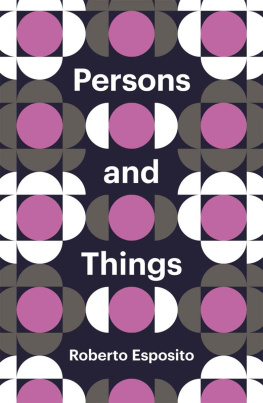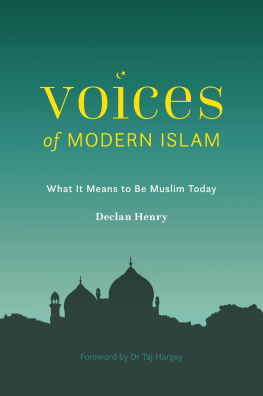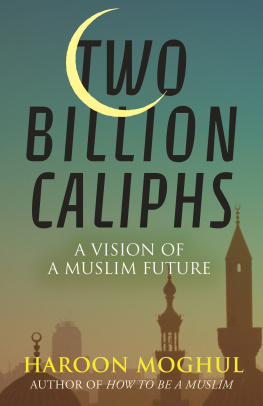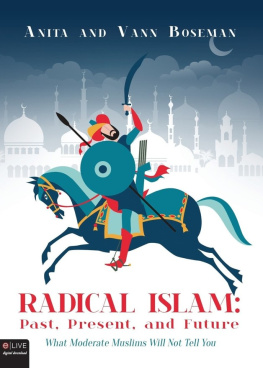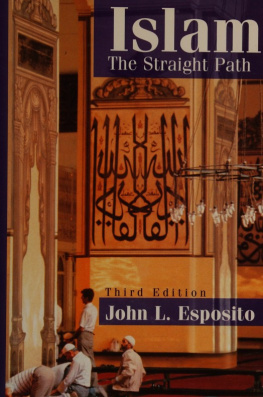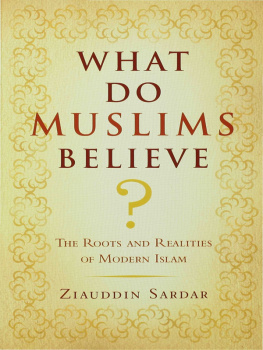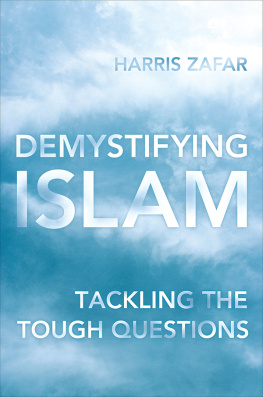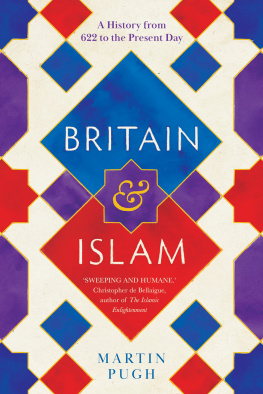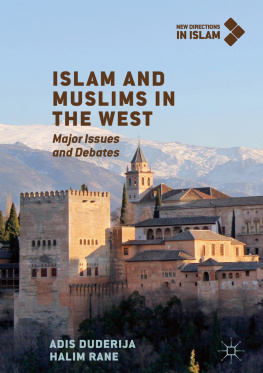Esposito - The Future of Islam
Here you can read online Esposito - The Future of Islam full text of the book (entire story) in english for free. Download pdf and epub, get meaning, cover and reviews about this ebook. City: Islamic countries;United States;Islamische Staaten;New York;N.Y;USA, year: 2010, publisher: Oxford University Press, genre: Politics. Description of the work, (preface) as well as reviews are available. Best literature library LitArk.com created for fans of good reading and offers a wide selection of genres:
Romance novel
Science fiction
Adventure
Detective
Science
History
Home and family
Prose
Art
Politics
Computer
Non-fiction
Religion
Business
Children
Humor
Choose a favorite category and find really read worthwhile books. Enjoy immersion in the world of imagination, feel the emotions of the characters or learn something new for yourself, make an fascinating discovery.

The Future of Islam: summary, description and annotation
We offer to read an annotation, description, summary or preface (depends on what the author of the book "The Future of Islam" wrote himself). If you haven't found the necessary information about the book — write in the comments, we will try to find it.
The Future of Islam — read online for free the complete book (whole text) full work
Below is the text of the book, divided by pages. System saving the place of the last page read, allows you to conveniently read the book "The Future of Islam" online for free, without having to search again every time where you left off. Put a bookmark, and you can go to the page where you finished reading at any time.
Font size:
Interval:
Bookmark:
THE FUTURE OF ISLAM
John L. Esposito


Oxford University Press, Inc., publishes works that further Oxford Universitys objective of excellence in research, scholarship, and education.
Oxford New York
Auckland Cape Town Dar es Salaam Hong Kong Karachi
Kuala Lumpur Madrid Melbourne Mexico City Nairobi
New Delhi Shanghai Taipei Toronto
With offices in
Argentina Austria Brazil Chile Czech Republic France Greece
Guatemala Hungary Italy Japan Poland Portugal Singapore
South Korea Switzerland Thailand Turkey Ukraine Vietnam
Copyright 2010 by Oxford University Press, Inc.
Published by Oxford University Press, Inc.
198 Madison Avenue, New York, NY 10016
www.oup.com
Oxford is a registered trademark of Oxford University Press
All rights reserved. No part of this publication may be reproduced, stored in a retrieval system, or transmitted, in any form or by any means, electronic, mechanical, photocopying, recording, or otherwise, without the prior permission of Oxford University Press.
Library of Congress Cataloging-in-Publication Data
Esposito, John L.
The future of Islam/John L. Esposito.
p. cm.
Includes index.
ISBN 978-0-19-516521-0
1. Islam21st century. 2. IslamRelations.
3. Islamic countriesRelationsUnited States.
4. United StatesRelationsIslamic countries. I. Title.
BP161.3.E867 2010
297.09051dc22 2009018732
1 3 5 7 9 8 6 4 2
Printed in the United States of America
on acid-free paper
For Jean
Past, Present, and Future
by Karen Armstrong
This is an important book. Those of us who have been on the front line of the effort, since the atrocities of September 11, 2001, to explain Islam in the Western world soon became aware not simply of the widespread ignorance of Muslim religion in both Europe and the United States but also of an entrenched reluctance to see Islam in a more favorable light. People often look balked and vaguely mutinous when, for example, you explain that the Quran does not in fact advocate the indiscriminate slaughter of the infidel or the propagation of the faith by the sword, and that even though there is still much to be done to promote gender equality in Muslim countries, the message of the Quran was initially friendly to the emancipation of women.
One of the most frequently asked questions is: Why has Islam not had a reformation? The query betrays an ignorance of both Islamic and Western history. It assumes that there was something special and unique about the reform movement initiated by Martin Luther (14831556) and John Calvin (150964) that points to the inherent superiority and progressive nature of our Western culture. In fact, Luthers was a typical premodern reformation, similar to many of the movements of islah (reform) and tajdid (renewal) that have regularly punctuated Muslim history. They all, Muslim or Christian, follow a similar agenda: they attempt to return to the wellsprings of tradition and cast aside the piety of the immediate past. Thus Luther and Calvin sought to return to the pure Christianity of the Bible and the Fathers of the Church, in exactly the same way as Ahmed ibn Taymiyyah of Damascus (12631328) advocated a return to the Quran and the sunnah (customal practice) of the Prophet Muhammad. In his desire to get back to basics, Ibn Taymiyyah also overturned much revered medieval jurisprudence and philosophy, just as Luther and Calvin attacked the medieval scholastic theologians; like any Muslim reformation, therefore, their movement was both reactionary and revolutionary.
Reform movements usually occur during a period of cultural change or in the wake of a great political disaster, when the old answers no longer suffice and reformers seek to bring the tradition up to date so that it can meet the contemporary challenge. The Protestant Reformation took place during the profound societal changes of the early modern period, when people found that they could no longer practice their faith in the same way as their medieval ancestors. It was, therefore, the product rather than a cause of modernization, and instead of being regarded as the instigator of change, Luther should rather be seen as the spokesman of a current trend. A similar process is now under way in the Muslim world, where the modernization process has been even more problematic than that of sixteenth-century Europe, because it has been complicated by the colonial disruption and continued Western influence in the internal affairs of the former colonies.
Again, Western people are often skeptical about the ability of Islam to reform itself and doubt the presence and effectiveness of Muslim reformers, in part because these creative thinkers get little coverage in the Western press. Thanks to this much-needed book, there is no longer any excuse for such ignorance. Professor Esposito has given a clear and informative introduction to the work of such reformers as Tariq Ramadan, Amr Khalid, Shaykh Ali Gomaa, Mustafa Ceric, Tim Winter, and Heba Raouf. Like Luther, these individuals articulate an important trend in Muslim thinking that challenges the common Western view of Islam. This trend clearly does not regard a literal interpretation of scripture as normative; it is well aware that laws and customs have been conditioned by the historical circumstances in which they developed and must be interpreted in the light of this understanding; it regards self-criticism as creative, necessary, and a religious imperative; it abhors terrorism and violence; and it is anxious to initiate a gender jihad.
Most important, Professor Esposito makes it clear that Western people simply cannot afford to remain uninformed about these developments in the Muslim world. He shows how the failure of Western foreign policy has been one of the causes of the current malaise in the region and that, for example, ignorance about the Sunni/Shia rift in Iraq made it impossible for the United States to identify friends and foes. We now live in one world and share a common predicament. What happens in Gaza or Afghanistan today is likely to have repercussions tomorrow in London or Washington, D.C. To persist in the belief that all Muslims support terrorism, oppose democracy, and are atavistically opposed to freedom is not only counterproductive to Western interests but, as we see in these pages, flies in the face of the evidence, such as that provided in the recent Gallup Poll. Westerners cannot expect Muslims to adopt a more positive view of their cultural values if they themselves persist in cultivating a stereotypical view of Islam that in some significant respects dates back to the Middle Ages. Unless we can learn to live together in a more just and rational way, we are unlikely to have a viable world to hand on to the next generation.
One comes away from this book convinced that the future of Islam does not simply depend on the effectiveness of a few Muslim reformers but that the United States and Europe also have a major role to play. If short-sighted Western policies have helped to create the current impasse, they will, if not corrected, continue to have a negative effect upon the region, will weaken the cause of reform, and play into the hands of extremists. In the Quran, God calls all men and women to appreciate the unity and equality of the human race: O people! Behold, We have created you all out of a male and a female, and have made you into nations and tribes so that you might come to know one another (49:13). One of the major tasks of our generation is to build a global community, where people of all persuasions can live together in harmony and mutual respect. In writing this book, which will help many Western readers to achieve a more balanced, informed, and nuanced appreciation of the Muslim world, Professor Esposito has made a major contribution.
Next pageFont size:
Interval:
Bookmark:
Similar books «The Future of Islam»
Look at similar books to The Future of Islam. We have selected literature similar in name and meaning in the hope of providing readers with more options to find new, interesting, not yet read works.
Discussion, reviews of the book The Future of Islam and just readers' own opinions. Leave your comments, write what you think about the work, its meaning or the main characters. Specify what exactly you liked and what you didn't like, and why you think so.

